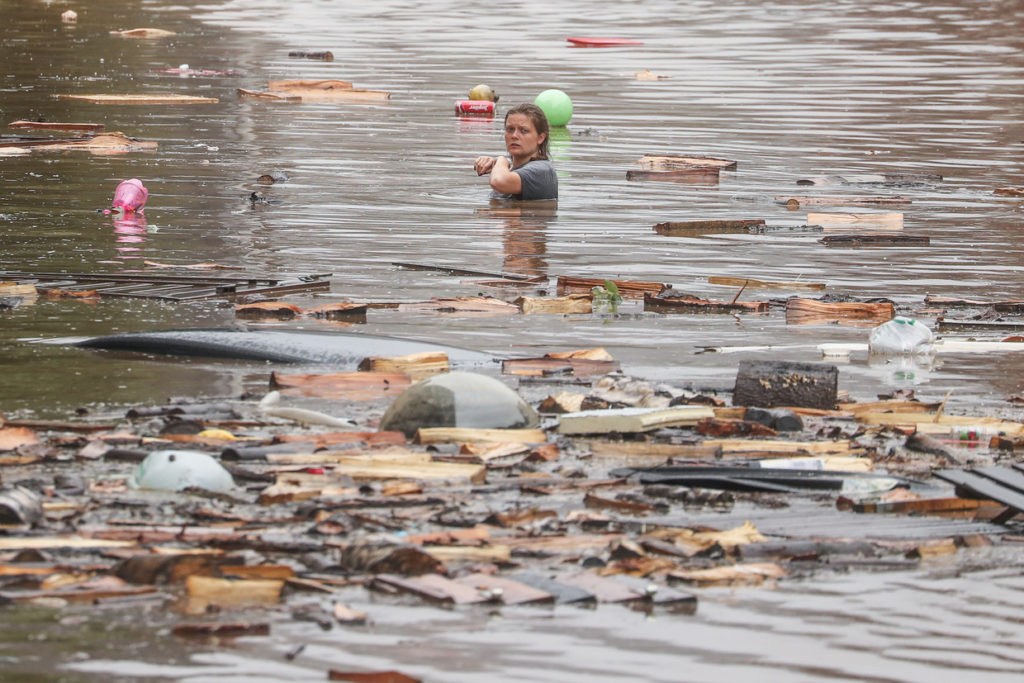The bodies of four people who died as a result of the floods have been found in the Liège province on Thursday, bringing the total death toll in Belgium to six as help from abroad is on its way.
The bodies were found in the district of Verviers, the public prosecutor's office announced. They died as a result of the heavy rainfall currently affecting the region, but there is no clarity yet on the victims' identities, or the places where their remains were found.
The Civil Protection Department is responsible for identifying the victims, according to the public prosecutor.
Earlier today, a 22-year-old man drowned in Eupen, in the east of the country, and in Aywaille, the body of a 50-year-old man was found in his cellar.
Additionally, divers and drones are searching for a 15-year-old girl who was swept away by the Ourthe river in the province of Luxembourg, but she has not yet been found.
Meanwhile, help is also coming from abroad as the EU just activated its aid mechanism, according to Interior Affairs Minister Annelies Verlinden.
"There are also emergency services from Antwerp, East Flanders and West Flanders who have come voluntarily to help," she said on Flemish radio. "We have deployed as many helicopters, boats but also drones to help people."
Related News
- Friday's Consultative Committee postponed due to bad weather
- Belgium in Brief: Rain, Rain, Rain
- Severe rainfall: Two dead as Belgium calls for help from neighbouring countries
In the municipality of Pepinster in the Liège province, civil protection and emergency services have also started evacuating people using boats, after about a dozen houses collapsed and roughly 60 people were sitting on their houses' rooftops while waiting for help.
Due to the strong currents, it took a while before the emergency services arrived at the scene. The water level in the area rose to roughly 2 metres, but has now reportedly started to recede.
Additionally, the level of the Meuse river in the city of Liège is rising further, with water starting to flow over the quays, according to the emergency services in Liege.
The Ourthe, which has burst its banks in many places in the province of Luxembourg, flows into the Meuse in the centre of Liège.
Un vieux liégeois m'a dit : en '90 il y avait beaucoup d'eau... Mais pas autant #liege #inondations pic.twitter.com/gRNo2kmL23
— Pieterjan Montens (@pieterjan_m) July 15, 2021
In the province of Flemish Brabant, governor Jan Spooren has called for a meeting of the provincial crisis cell at 2:00 PM, to assess the situation and possibly take extra measures.
Meanwhile, in the Flemish-Brabant municipality of Glabbeek, the municipal phase of the emergency plan has already been activated.
"In several other municipalities this is not yet the case, but there is operational coordination, where emergency services and local authorities consult," Spooren told De Morgen.
At the meeting, "we will look at which municipalities need support and whether we might move to the provincial phase of the emergency plan."
"The situation in the province, especially in the eastern part, is worrying," he added. "Especially worrying is the water level of the rivers, which threatens to reach critical points in several places."
In Brussels, some 20 interventions are underway, while about 30 others are pending, according to a spokesperson of the fire department. Additionally, several tunnels, such as the Stéphanie, the Porte de Hal, Vleurgat and the NAVO-tunnel, are closed due to flooding caused by heavy rainfall.

